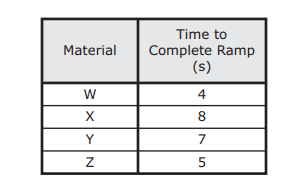
STAAR Science Grade 8 2014 (tagged to 2021 standards)
Quiz by Grade 8 Science - Texas Education Agency
Feel free to use or edit a copy
includes Teacher and Student dashboards
Measures 30 skills from
- edit the questions
- save a copy for later
- start a class game
- automatically assign follow-up activities based on students’ scores
- assign as homework
- share a link with colleagues
- print as a bubble sheet
- Q1A student lets a toy car roll four times down a ramp that is 1 m long. Each time the student covers the surface of the ramp with a different material. The student measures the time it takes the car to roll down the ramp and records the results in the table below. Which of these would be the best conclusion based on the data in the table?Different surfaces affect how fast a toy car accelerates.Air resistance is the greatest factor in limiting the acceleration of different toy cars.Different toy cars travel at different speeds.Gravity has little effect on the speed of toy cars on different surfaces.60s8.7(B)
- Q2The diagram below models Mercury and Venus orbiting the sun. What force causes Venus to travel along a curved path instead of moving in a straight line as indicated by the dashed line in the diagram?Electromagnetic attraction between Mercury and VenusGravitational attraction between the sun and VenusGravitational attraction between Mercury and VenusElectromagnetic attraction between the sun and Venus60s7.9(B)
- Q3
Before the Industrial Revolution in England, the peppered moth was commonly found on tree trunks that had light-colored lichen on the bark. Most of the peppered moths were a light gray-brown color similar to that of the lichen. A few of the moths had a mutation that made them a dark gray-brown color.
During the Industrial Revolution, coal-burning factories produced black soot that covered the trees and killed the lichen in and near cities. In these areas the number of dark peppered moths increased, while the number of light peppered moths decreased. What contributed to this change?
The dark moths preyed on the light moths.The soot-covered trees camouflaged the dark moths.Bird populations increased in the areas near the factories.The dark moths laid fewer eggs than the light moths.60s7.11(B) - Q4Four students were asked to classify the activities of the people in the picture below as examples of either potential or kinetic energy. Which student correctly classified the activities?60s6.8(A)
- Q5
The Prairies Region and the Cross Timbers are located in north-central Texas. The graph below shows information about eating habits of white-tailed deer in these regions.
A Cross Timbers rancher is concerned about competition between the ranch animals and the deer. Based on the graph, which ranch animals compete for the most food with white-tailed deer?
Turkeys that eat seeds and fruitHogs that eat fruit, seeds, and feedGoats that eat weeds and shrubsCattle that eat grass and feed60s8.12(A) - Q6Many processes occur in the digestive system. Which process is best classified as a physical change?Teeth grinding an almond into smaller pieces in the mouthSaliva converting the starch molecules in crackers into simple sugarsBacteria converting lactose into simple sugars in the intestinesDigestive enzymes breaking down proteins into smaller fragments60s
- Q7
When Charles Darwin visited the Galápagos Islands in the 1800s, he observed many types of organisms that were similar but lived on different islands. The four species of mockingbirds found on the Galápagos Islands are shown below. Each species lives on a different island.
These species are very similar, but the Hood mockingbird has a longer beak than the other three species. Which of the following best explains this difference?
The Hood mockingbird’s longer beak is an adaptation to the food available in the bird’s habitat.The Hood mockingbird needs a longer beak for defense against predators.The Hood mockingbird’s beak stretched to reach its food, and the longer beak was passed down to its offspring.The Hood mockingbird originated from a different type of bird than the other species.60s7.13(D) - Q8A Hertzsprung-Russell diagram is shown below. Based on this diagram, which type of stars would belong to spectral class M and have the highest luminosity?SupergiantsMain-sequence starsWhite dwarfsGiants60s8.9(A)
- Q9When a lion eats a zebra and then uses the energy from the zebra to run, the lion’s body converts —chemical energy to mechanical energychemical energy to light energymechanical energy to chemical energyelectrical energy to chemical energy60s6.8(B)
- Q10
Some students in a chemistry lab conducted an investigation in which they added four different solid substances to separate beakers of water. They stirred the mixtures for one minute and then recorded their observations in the table below.
Which substance most likely caused a new substance to be formed when mixed with water?
Substance 2Substance 1Substance 3Substance 460s8.6(E) - Q11Which of these correctly describes a relationship between organisms in the soil food web below?Protozoa get nutrients from small arthropods.Nematodes prey on arthropods.Bacteria get nutrients from organic matter.Mammals are predators of birds.60s6.12(A)
- Q12Scientists recently discovered that rocks collected from the Franklin Mountains in West Texas and rocks collected from mountains in eastern Antarctica were exactly the same age. Further research showed that the rocks were chemically and geologically the same and came from the same magma source. This discovery provides evidence of —glacial meltingocean currentscoastal erosionplate tectonics60s7.10(A)
- Q13
Galveston Bay, an estuary in Southeast Texas, is shown below. The amount of salt in the water changes with the tides. Sometimes the water is mostly freshwater, and sometimes it is mixed with saltwater. Various plant species live in this environment and provide a habitat for other organisms.
To successfully live in an estuary, a plant species must have an adaptation that allows it to —
absorb large amounts of waterstore excess gasesfilter excess saltproduce large amounts of food60s7.11(B) - Q14The flow of energy in some Australian food chains is modeled in the energy pyramid below. Based on the model, which consumers would receive the greatest amount of energy captured by the producers in their food chains?ChuditchWedge-tailed eaglesEucalyptus treesRing-tailed opossums60s
- Q15
The satellite image below shows a ship channel between South Padre Island and Boca Chica beach in South Texas.
Sand is sometimes removed from the ship channel through a process called dredging to make it easier for ships to travel through. Recently sand from the bottom of the channel was moved to area beaches. Without this transfer of sand, what would most likely occur in this area in the future?
The ship channel would become narrower, and the island would become completely covered with water.The ship channel would become wider, and the island would sink into the Gulf of Mexico.The ship channel would become shallower, and the beach would become narrower.The ship channel would become deeper, and the island would move west toward the mainland.60s
